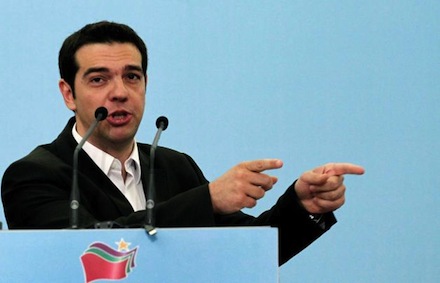Alexis Tsipras laid out his party’s program for the upcoming June 17 Greek election on Friday.![]()
Tsipras said a SYRIZA government would immediately reject the memorandum on coming to power and ask for Greece’s debt to be restructured or for a moratorium on repayments. It would then repeal a reduction to the minimum wage and extend unemployment benefit to two years. It would also repeal recent labor market reforms limiting collective contracts.
Tsipras set out how his government would stabilize the economy. He said public spending would be set at between 43 and 46 percent of GDP, rather than under 36 percent as agreed in the memorandum. The SYRIZA leader said he would raise revenues by cutting down on tax evasion, waste and corruption and forming an assets register for all Greeks at home and abroad. The wealthy would pay more under a new tax system, he said.
The key takeaway point is that it is not substantively different from the program under which he led SYRIZA, the Coalition of the Radical Left (Συνασπισμός Ριζοσπαστικής Αριστεράς) in the previous May elections.
It does, however, highlight a subtle but unmistakable shift in the tone of Tsipras’s main rival, Antonis Samaras, the leader of New Democracy (Νέα Δημοκρατία), the center-right pro-bailout party that finished first in the May election. Samaras in recent days has increasingly been taking a softer line on renegotiating Greece’s austerity program with the European Commission, the European Central Bank and the International Monetary Fund, all of which granted two bailouts to Greece in exchange for its adoption of austerity measures and labor market reforms.
Although Samaras has raged throughout both campaigns that a SYRIZA win would be catastrophic and lead to Greece’s exit from the eurozone, it’s clear that in the second campaign, ND and the pro-bailout PASOK (Panhellenic Socialist Movement — Πανελλήνιο Σοσιαλιστικό Κίνημα) are moving toward SYRIZA’s position.
It’s clear that Greeks want relief from the austerity program that has driven the country into depression-like economic conditions (which Tsipras promises), but also remain very committed to remaining in the eurozone (which Samaras promises). If there’s a way to accomplish those two somewhat incongruent goals (and that depends more on people outside of Greece), this election is about figuring out who is more likely to do so.
As was the case during the first campaign, Democratic Left leader Fotis Kouvelis remains by far the most popular of Greece’s political leaders, with an approval rating of 67% (Tspiras’s approval is just 49%), and so stands to emerge as a key player in post-election negotiations.
The Public Issue poll would result in just enough seats for SYRIZA to form a government with the Democratic Left, maybe with some other parties (Independent Greeks and/or PASOK), but maybe not. Either way, Kouvelis’s presence in the government will pull it further into the realm of moderation. So I don’t think we would see any immediate nationalization of Greek industry and, contrary to what Tsipras has said, I don’t think you’d see a Tsipras-led coalition rip up the memorandum on its first day, because Kouvelis simply would not allow it.
It is also easy to see how, if ND wins the most seats, Kouvelis would be willing to do what he refused following the first election — join in a coalition with ND and PASOK rather than plunge the country into a third set of elections, given Samaras’s softening position on renegotiating Greece’s budget. But in exchange for that support, Kouvelis would likely require that a Samaras-led government to be incredibly aggressive in its attempt to renegotiate Greece’s austerity program.
The convergence means that whatever happens on June 17, it seems incredibly likely that a Greek coalition government will emerge shortly thereafter, which will include Kouvelis as a very senior member, committed to holding new talks with EU and IMF leaders over the terms of Greece’s bailout that will attempt to ameliorate the worst of Greece’s budget cuts.
The only unknown variable is whether Greeks will choose Tsipras or Samaras to lead the government that will attempt to do so.

One thought on “Tsipras outlines SYRIZA program, as Samaras shifts tone toward bailout renegotiation”